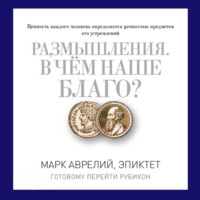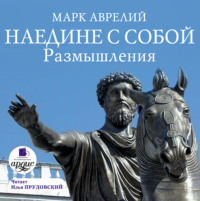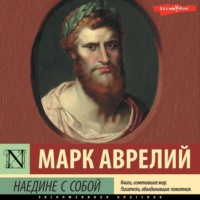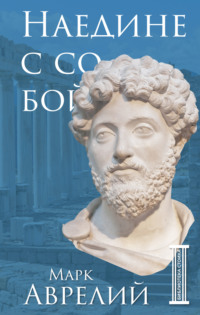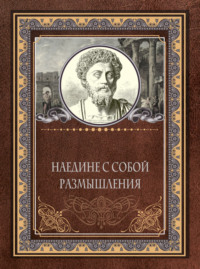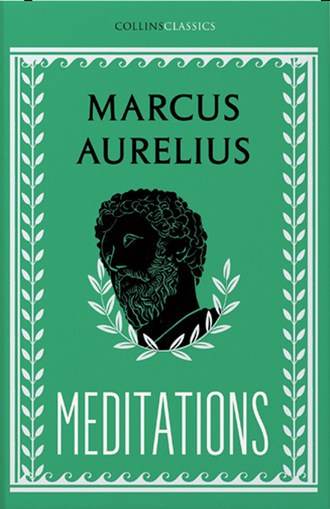
Meditations

MEDITATIONS
Marcus Aurelius

Copyright
William Collins
An imprint of HarperCollinsPublishers
1 London Bridge Street
London SE1 9GF
WilliamCollinsBooks.com
This eBook first published in Great Britain by William Collins in 2020
Cover photograph © Shutterstock
A catalogue record for this book is available from the British Library
All rights reserved under International and Pan-American Copyright Conventions. By payment of the required fees, you have been granted the non-exclusive, non-transferable right to access and read the text of this e-book on-screen. No part of this text may be reproduced, transmitted, down-loaded, decompiled, reverse engineered, or stored in or introduced into any information storage and retrieval system, in any form or by any means, whether electronic or mechanical, now known or hereinafter invented, without the express written permission of HarperCollins
Source ISBN: 9780008425029
Ebook Edition © September 2020 ISBN: 9780008425036
Version: 2020-08-27
History of William Collins
In 1819, millworker William Collins from Glasgow, Scotland, set up a company for printing and publishing pamphlets, sermons, hymn books, and prayer books. That company was Collins and was to mark the birth of HarperCollins Publishers as we know it today. The long tradition of Collins dictionary publishing can be traced back to the first dictionary William co-published in 1825, Greek and English Lexicon. Indeed, from 1840 onwards, he began to produce illustrated dictionaries and even obtained a licence to print and publish the Bible.
Soon after, William published the first Collins novel; however, it was the time of the Long Depression, where harvests were poor, prices were high, potato crops had failed, and violence was erupting in Europe. As a result, many factories across the country were forced to close down and William chose to retire in 1846, partly due to the hardships he was facing.
Aged 30, William’s son, William II, took over the business. A keen humanitarian with a warm heart and a generous spirit, William II was truly “Victorian” in his outlook. He introduced new, up-to-date steam presses and published affordable editions of Shakespeare’s works and The Pilgrim’s Progress, making them available to the masses for the first time.
A new demand for educational books meant that success came with the publication of travel books, scientific books, encyclopedias, and dictionaries. This demand to be educated led to the later publication of atlases, and Collins also held the monopoly on scripture writing at the time.
In the 1860s Collins began to expand and diversify and the idea of “books for the millions” was developed, although the phrase wasn’t coined until 1907. Affordable editions of classical literature were published, and in 1903 Collins introduced 10 titles in their Collins Handy Illustrated Pocket Novels. These proved so popular that a few years later this had increased to an output of 50 volumes, selling nearly half a million in their year of publication. In the same year, The Everyman’s Library was also instituted, with the idea of publishing an affordable library of the most important classical works, biographies, religious and philosophical treatments, plays, poems, travel, and adventure. This series eclipsed all competition at the time, and the introduction of paperback books in the 1950s helped to open that market and marked a high point in the industry.
HarperCollins is and has always been a champion of the classics, and the current Collins Classics series follows in this tradition—publishing classical literature that is affordable and available to all. Beautifully packaged, highly collectible, and intended to be reread and enjoyed at every opportunity.
Life and Times
Meditations
Despite a nineteen-year reign over the Roman Empire, during which war, plague and unrest ravaged much of the known world, Marcus Aurelius is chiefly known to us today as the cool-headed author of Meditations, a seminal work of Stoic writing that would go on to be the favourite of many public figures, and whose influence reaches us today in the form of psychotherapy treatments such as cognitive behavioural therapy. However, this far-reaching piece of writing was initially intended merely as solace for the introspective emperor as he faced war and sickness, and the loss of friends and family.
Early life and education
Marcus Aurelius was born in Rome in 121 AD to a noble family. He was very much embedded in the ruling class, with a grandfather who was a consul, and an aunt married to the emperor. His mother also came from a prominent family and had inherited a significant fortune. Aurelius’s father died when he was only three years old and he was subsequently brought up by his mother and grandfather, though he would have spent more time in the care of nurses and tutors. According to Aurelius himself, one such tutor, Junius Rusticus, had a profound influence on him, and was the inspiration for his lifelong interest in philosophy. Rusticus, himself a Stoic philosopher, introduced Aurelius to the works of Epictetus, who was one of the great ancient Greek Stoic philosophers. Aurelius continued to investigate the ideas of Stoicism throughout his life, and mentions Rusticus and Epictetus in Meditations.
His education was also conducted by prominent orators of his time, including Herodes Atticus and Marcus Cornelius Fronto, the latter becoming a lifelong friend with whom he kept up a warm correspondence. He had several Greek tutors, which shows the convergence of Greco-Roman culture at the time, and the preference for the language is apparent in Aurelius’s own personal writings, which were conducted in Greek.
Road to the throne
Aurelius spent his youth under the rule of Emperor Hadrian. The ailing emperor Hadrian made several attempts to secure his line of succession, first by naming Lucius Ceionius Commodus, who was the father of Aurelius’s fiancé, as his heir. However, Commodus died within a few years, and Hadrian was once again in need of a successor. He decided to name Titus Aurelius Antoninus as his heir, but stipulated that Antonius must adopt Marcus Aurelius and Lucius Veras the younger as his sons, and therefore heirs. It may be assumed that Hadrian intended for Marcus Aurelius to become ruler eventually, which is why he went about fixing the line of succession in this way.
In his last years of his life, Hadrian suffered from chronic illness and made several attempts at suicide. He finally passed away in 138 AD and was succeeded by Antoninus, who ruled as Antoninus Pius. As heir apparent, the young Aurelius became firmly embedded in political life and the world of the court, despite his misgivings and concerns over maintaining his Stoic outlook. Indeed, the ‘gilded cage’ of his upbringing and special treatment could have easily turned his head, but Aurelius showed a depth of thought, even at a young age, which kept him grounded.
Further cementing his connection with the Emperor Pius, Aurelius married his daughter, Faustina, in 145 AD, with whom he had several children. He continued to be appointed to high-ranking political roles, and as his adoptive father Antoninus began to lose his health, Aurelius and Lucius were made joint consuls. As he died, Antoninus left the ruling of the state to Marcus Aurelius.
Reign
Marcus Aurelius insisted that his adoptive brother be named co-emperor alongside him, and so they began their rule together, having been trained for the role for decades. This was the first time in the Roman Empire’s history that it was ruled by two emperors at once. However, Marcus Aurelius maintained a position of higher authority throughout their rule and went on to rule for several years after Lucius’s death.
Marcus Aurelius made significant contributions to the field of law, in which he was well-versed after decades of study and work leading up to his rule. His legislative work shows a concern with the life of widows, orphans and slaves. However, recent historians have argued that the good-natured ruler was also responsible for the increased prosecution of Christians under his rule.
Aurelius lead the empire in two significant wars: the Roman-Parthian War and the Marcommanic Wars, fought against Germanic tribes. Soldiers returning from war brought with them a deadly plague that went on to kill millions of people within the Roman Empire.
Meditations
Aurelius wrote his now famous Meditations while on a campaign in the 170s. Unlike such treatises on the Stoic way of life as Seneca’s Letters from a Stoic, Aurelius doesn’t seem to have intended this collection of musings to be publicly consumed. They are deeply introspective thoughts, written in Greek, about his own self-improvement.
Consisting of twelve books, the text has a simple and straightforward style, prone to aphorisms, that shows a clarity of thought. One of the central themes is a separation of one’s own actions, reactions and judgements which one can control, from the external world which is under the control of no one. ‘If thou art pained by any external thing, it is not this that disturbs thee, but thy own judgment about it. And it is in thy power to wipe out this judgment now.’ Such words have proved a comfort for many readers throughout the centuries, from the likes of Matthew Arnold to Bill Clinton.
Later life and death
Towards the end of his life, Aurelius co-ruled with his biological son, Commodus, whom he named his successor. Aurelius died in 180 AD in modern-day Vienna, according to some historians, from the Antonine Plague that had ravaged his empire for years. This marked the end of the Pax Romana, an era of relative peace and prosperity in the Roman Empire beginning with the reign of Augustus. As a true Stoic, Marcus Aurelius was said to have greeted death with composure and acceptance.
CONTENTS
Cover
Title Page
Copyright
History of William Collins
Life and Times
Book I
Book II
Book III
Book IV
Book V
Book VI
Book VII
Book VIII
Book IX
Book X
Book XI
Book XII
Classic Literature: Words and Phrases
About the Publisher
BOOK I
From my grandfather Verus I learned good morals and the government of my temper.
From the reputation and remembrance of my father, modesty and a manly character.
From my mother, piety and beneficence, and abstinence, not only from evil deeds, but even from evil thoughts; and further, simplicity in my way of living, far removed from the habits of the rich.
From my great-grandfather, not to have frequented public schools, and to have had good teachers at home, and to know that on such things a man should spend liberally.
From my governor, to be neither of the green nor of the blue party at the games in the Circus, nor a partisan either of the Parmularius or the Scutarius at the gladiators’ fights; from him too I learned endurance of labour, and to want little, and to work with my own hands, and not to meddle with other people’s affairs, and not to be ready to listen to slander.
From Diognetus, not to busy myself about trifling things, and not to give credit to what was said by miracle-workers and jugglers about incantations and the driving away of daemons and such things; and not to breed quails for fighting, nor to give myself up passionately to such things; and to endure freedom of speech; and to have become intimate with philosophy; and to have been a hearer, first of Bacchius, then of Tandasis and Marcianus; and to have written dialogues in my youth; and to have desired a plank bed and skin, and whatever else of the kind belongs to the Grecian discipline.
From Rusticus I received the impression that my character required improvement and discipline; and from him I learned not to be led astray to sophistic emulation, nor to writing on speculative matters, nor to delivering little hortatory orations, nor to showing myself off as a man who practises much discipline, or does benevolent acts in order to make a display; and to abstain from rhetoric, and poetry, and fine writing; and not to walk about in the house in my outdoor dress, nor to do other things of the kind; and to write my letters with simplicity, like the letter which Rusticus wrote from Sinuessa to my mother; and with respect to those who have offended me by words, or done me wrong, to be easily disposed to be pacified and reconciled, as soon as they have shown a readiness to be reconciled; and to read carefully, and not to be satisfied with a superficial understanding of a book; nor hastily to give my assent to those who talk overmuch; and I am indebted to him for being acquainted with the discourses of Epictetus, which he communicated to me out of his own collection.
From Apollonius I learned freedom of will and undeviating steadiness of purpose; and to look to nothing else, not even for a moment, except to reason; and to be always the same, in sharp pains, on the occasion of the loss of a child, and in long illness; and to see clearly in a living example that the same man can be both most resolute and yielding, and not peevish in giving his instruction; and to have had before my eyes a man who clearly considered his experience and his skill in expounding philosophical principles as the smallest of his merits; and from him I learned how to receive from friends what are esteemed favours, without being either humbled by them or letting them pass unnoticed.
From Sextus, a benevolent disposition, and the example of a family governed in a fatherly manner, and the idea of living conformably to nature; and gravity without affectation, and to look carefully after the interests of friends, and to tolerate ignorant persons, and those who form opinions without consideration: he had the power of readily accommodating himself to all, so that intercourse with him was more agreeable than any flattery; and at the same time he was most highly venerated by those who associated with him: and he had the faculty both of discovering and ordering, in an intelligent and methodical way, the principles necessary for life; and he never showed anger or any other passion, but was entirely free from passion, and also most affectionate; and he could express approbation without noisy display, and he possessed much knowledge without ostentation.
From Alexander the grammarian, to refrain from faultfinding, and not in a reproachful way to chide those who uttered any barbarous or solecistic or strange-sounding expression; but dexterously to introduce the very expression which ought to have been used, and in the way of answer or giving confirmation, or joining in an inquiry about the thing itself, not about the word, or by some other fit suggestion.
From Fronto I learned to observe what envy, and duplicity, and hypocrisy are in a tyrant, and that generally those among us who are called Patricians are rather deficient in paternal affection.
From Alexander the Platonic, not frequently nor without necessity to say to anyone, or to write in a letter, that I have no leisure; nor continually to excuse the neglect of duties required by our relation to those with whom we live, by alleging urgent occupations.
From Catulus, not to be indifferent when a friend finds fault, even if he should find fault without reason, but to try to restore him to his usual disposition; and to be ready to speak well of teachers, as it is reported of Domitius and Athenodotus; and to love my children truly.
From my brother Severus, to love my kin, and to love truth, and to love justice; and through him I learned to know Thrasea, Helvidius, Cato, Dion, Brutus; and from him I received the idea of a polity in which there is the same law for all, a polity administered with regard to equal rights and equal freedom of speech, and the idea of a kingly government which respects most of all the freedom of the governed; I learned from him also consistency and undeviating steadiness in my regard for philosophy; and a disposition to do good, and to give to others readily, and to cherish good hopes, and to believe that I am loved by my friends; and in him I observed no concealment of his opinions with respect to those whom he condemned, and that his friends had no need to conjecture what he wished or did not wish, but it was quite plain.
From Maximus I learned self-government, and not to be led aside by anything; and cheerfulness in all circumstances, as well as in illness; and a just admixture in the moral character of sweetness and dignity, and to do what was set before me without complaining. I observed that everybody believed that he thought as he spoke, and that in all that he did he never had any bad intention; and he never showed amazement and surprise, and was never in a hurry, and never put off doing a thing, nor was perplexed nor dejected, nor did he ever laugh to disguise his vexation, nor, on the other hand, was he ever passionate or suspicious. He was accustomed to do acts of beneficence, and was ready to forgive, and was free from all falsehood; and he presented the appearance of a man who could not be diverted from right rather than of a man who had been improved. I observed, too, that no man could ever think that he was despised by Maximus, or ever venture to think himself a better man. He had also the art of being humorous in an agreeable way.
In my father I observed mildness of temper, and unchangeable resolution in the things which he had determined after due deliberation; and no vainglory in those things which men call honours; and a love of labour and perseverance; and a readiness to listen to those who had anything to propose for the common weal; and undeviating firmness in giving to every man according to his deserts; and a knowledge derived from experience of the occasions for vigorous action and for remission. And I observed that he had overcome all passion for boys; and he considered himself no more than any other citizen; and he released his friends from all obligation to sup with him or to attend him of necessity when he went abroad, and those who had failed to accompany him, by reason of any urgent circumstances, always found him the same. I observed too his habit of careful inquiry in all matters of deliberation, and his persistency, and that he never stopped his investigation through being satisfied with appearances which first present themselves; and that his disposition was to keep his friends, and not to be soon tired of them, nor yet to be extravagant in his affection; and to be satisfied on all occasions, and cheerful; and to foresee things a long way off, and to provide for the smallest without display; and to check immediately popular applause and all flattery; and to be ever watchful over the things which were necessary for the administration of the empire, and to be a good manager of the expenditure, and patiently to endure the blame which he got for such conduct; and he was neither superstitious with respect to the gods, nor did he court men by gifts or by trying to please them, or by flattering the populace; but he showed sobriety in all things and firmness, and never any mean thoughts or action, nor love of novelty. And the things which conduce in any way to the commodity of life, and of which fortune gives an abundant supply, he used without arrogance and without excusing himself; so that when he had them, he enjoyed them without affectation, and when he had them not, he did not want them. No one could ever say of him that he was either a sophist or a homebred flippant slave or a pedant; but everyone acknowledged him to be a man ripe, perfect, above flattery, able to manage his own and other men’s affairs. Besides this, he honoured those who were true philosophers, and he did not reproach those who pretended to be philosophers, nor yet was he easily led by them. He was also easy in conversation, and he made himself agreeable without any offensive affectation. He took a reasonable care of his body’s health, not as one who was greatly attached to life, nor out of regard to personal appearance, nor yet in a careless way, but so that, through his own attention, he very seldom stood in need of the physician’s art or of medicine or external applications. He was most ready to give way without envy to those who possessed any particular faculty, such as that of eloquence or knowledge of the law or of morals, or of anything else; and he gave them his help, that each might enjoy reputation according to his deserts; and he always acted conformably to the institutions of his country, without showing any affectation of doing so. Further, he was not fond of change nor unsteady, but he loved to stay in the same places, and to employ himself about the same things; and after his paroxysms of headache he came immediately fresh and vigorous to his usual occupations. His secrets were not but very few and very rare, and these only about public matters; and he showed prudence and economy in the exhibition of the public spectacles and the construction of public buildings, his donations to the people, and in such things, for he was a man who looked to what ought to be done, not to the reputation which is got by a man’s acts. He did not take the bath at unseasonable hours; he was not fond of building houses, nor curious about what he ate, nor about the texture and colour of his clothes, nor about the beauty of his slaves. His dress came from Lorium, his villa on the coast, and from Lanuvium generally. We know how he behaved to the toll-collector at Tusculum who asked his pardon; and such was all his behaviour. There was in him nothing harsh, nor implacable, nor violent, nor, as one may say, anything carried to the sweating point; but he examined all things severally, as if he had abundance of time, and without confusion, in an orderly way, vigorously and consistently. And that might be applied to him which is recorded of Socrates, that he was able both to abstain from, and to enjoy, those things which many are too weak to abstain from, and cannot enjoy without excess. But to be strong enough both to bear the one and to be sober in the other is the mark of a man who has a perfect and invincible soul, such as he showed in the illness of Maximus.
To the gods I am indebted for having good grandfathers, good parents, a good sister, good teachers, good associates, good kinsmen and friends, nearly everything good. Further, I owe it to the gods that I was not hurried into any offence against any of them, though I had a disposition which, if opportunity had offered, might have led me to do something of this kind; but, through their favour, there never was such a concurrence of circumstances as put me to the trial. Further, I am thankful to the gods that I was not longer brought up with my grandfather’s concubine, and that I preserved the flower of my youth, and that I did not make proof of my virility before the proper season, but even deferred the time; that I was subjected to a ruler and a father who was able to take away all pride from me, and to bring me to the knowledge that it is possible for a man to live in a palace without wanting either guards or embroidered dresses, or torches and statues, and suchlike show; but that it is in such a man’s power to bring himself very near to the fashion of a private person, without being for this reason either meaner in thought, or more remiss in action, with respect to the things which must be done for the public interest in a manner that befits a ruler. I thank the gods for giving me such a brother, who was able by his moral character to rouse me to vigilance over myself, and who, at the same time, pleased me by his respect and affection; that my children have not been stupid nor deformed in body; that I did not make more proficiency in rhetoric, poetry, and the other studies, in which I should perhaps have been completely engaged, if I had seen that I was making progress in them; that I made haste to place those who brought me up in the station of honour, which they seemed to desire, without putting them off with hope of my doing it some time after, because they were then still young; that I knew Apollonius, Rusticus, Maximus; that I received clear and frequent impressions about living according to nature, and what kind of a life that is, so that, so far as depended on the gods, and their gifts, and help, and inspirations, nothing hindered me from forthwith living according to nature, though I still fall short of it through my own fault, and through not observing the admonitions of the gods, and, I may almost say, their direct instructions; that my body has held out so long in such a kind of life; that I never touched either Benedicta or Theodotus, and that, after having fallen into amatory passions, I was cured; and, though I was often out of humour with Rusticus, I never did anything of which I had occasion to repent; that, though it was my mother’s fate to die young, she spent the last years of her life with me; that, whenever I wished to help any man in his need, or on any other occasion, I was never told that I had not the means of doing it; and that to myself the same necessity never happened, to receive anything from another; that I have such a wife, so obedient, and so affectionate, and so simple; that I had abundance of good masters for my children; and that remedies have been shown to me by dreams, both others, and against blood-spitting and giddiness …; and that, when I had an inclination to philosophy, I did not fall into the hands of any sophist, and that I did not waste my time on writers of histories, or in the resolution of syllogisms, or occupy myself about the investigation of appearances in the heavens; for all these things require the help of the gods and fortune.





